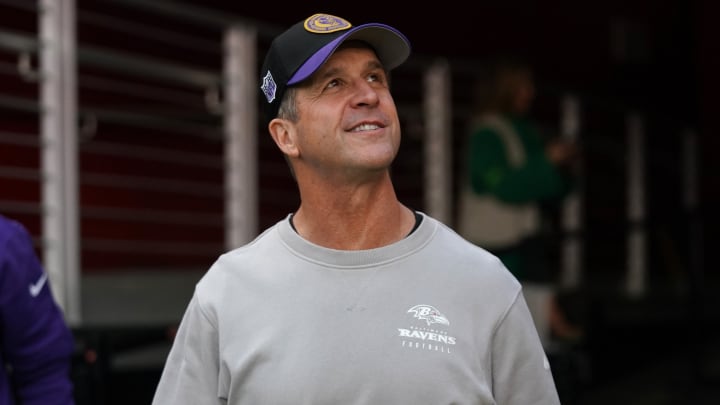The Ravens Let John Harbaugh Evolve, Not Expire, and Are Better for It

An NFL coaching job is not a tenure-track position, as we learned this offseason. The New England Patriots gently shoved Bill Belichick out the door in an attempt to secure the Kraft Family’s slice of credit for the team’s dynasty. Pete Carroll, too, wanted to continue coaching the Seattle Seahawks and was instead offered the opportunity to still have a working email address and key card access to the weight room (which you obviously take … have you seen fitness center prices these days?)
Mike Tomlin is coming back to coach the Pittsburgh Steelers, but not without enough of a discussion about his slowly expiring contract and future to make him walk off the podium after the team’s first-round playoff loss. Mike McCarthy is going to, after three consecutive 12-win seasons, coach the lame-duck year of his contract for the Dallas Cowboys.
In short, it’s not the greatest place in the world if you haven’t won a Super Bowl in a while (or last year, in the case of the Philadelphia Eagles’ Nick Sirianni). Coaching salaries are relatively cheap for now (Bill Belichick and bidding wars for Ben Johnson and Jim Harbaugh will change the financial landscape there) and, with the ever-fattening profits of the ownership class, are considered the most simple way to overhaul a franchise when times get tough or the drink-thrower in the suite gets impatient.
But it’s hard not to think about John Harbaugh on Saturday night as his No. 1 seeded Baltimore Ravens rolled over the upstart Houston Texans in Baltimore. After a spirited first half—DeMeco Ryans’s defense seemed to give Lamar Jackson some fits with a series of designed pressures—Baltimore rolled in the second. Midway through the fourth quarter, it was time to listen to Joe Buck and Troy Aikman navel gaze. C.J. Stroud was nervously skying passes (you know, actually looking like a rookie for a second). Mike Macdonald, the Ravens’ defensive coordinator, was ripping secondary blitzes.

Back in 2018, the coaching carousel rumor du jour heading into December was that Harbaugh and the Ravens would call it quits. Baltimore was 5–5 heading into the bye week that year, and was in the middle of a three-year streak without a postseason berth. Joe Flacco was phasing out of relevance (at least until he was again put in charge of quarterbacking a team with a lights-out defense at the tail end of this year), and it appeared that the iteration of the Ravens that Harbaugh built was flatlining. One could only imagine, in hindsight, what kind of shape Baltimore would be in now had they jumped into the *checks notes* Kliff Kingsbury or Freddie Kitchens sweepstakes that year and tried to actually replace Harbaugh after allowing him to move on.
Anyway … the Ravens ended up winning five of their last six games in 2018 and winning the AFC North. The team went 14–2 the following year, and 11–5 the year after that. The team has had just one losing season (in 2021) since that moment. We haven’t heard much about a divorce since.
This isn’t meant to hold up Baltimore as some kind of example, but it is—I think—a crash course in what happens when you allow (or force) a good head coach to evolve. It’s also a check in the box for giving the situation time. Harbaugh dramatically transformed the team to accommodate Lamar Jackson a few years back, and did so again prior to this year, dismissing longtime offensive coordinator Greg Roman and replacing him with Todd Monken. Much has been written about the result of these changes, but I don’t think enough has been written about the allowance of time to institute these evolutions. And I don’t think anything has been written about the reality that consistent winning, over the course of decades, with drastically different versions of the roster, is just as, if not more impressive than one wayward Super Bowl. And yet, we place so much emphasis on one versus another, even though consistency is so much more difficult.
I know this sounds indigestible to fans (and Rams fans don’t count because there aren’t really any) who get a little bit of tunnel vision when the spaces between Lombardi trophies get too wide. But Harbaugh has ensured, so many different times, that the Ravens were in the tournament with a relatively good shot at making some noise. With so many other variables—this year, for example, the NFL decided to play two playoff games in settings more familiar to Iditarod racers—there isn’t a lot more a fan of a franchise can ask for.
I’m sure, looking back on it, whatever caused the discussion of a fraying relationship between Harbaugh and the Ravens was something to laugh about in hindsight. I’m curious if a team such as Philadelphia might say the same in a couple of years by handling Sirianni the same way. I wonder how New England and Seattle will find life off the tenure track.
